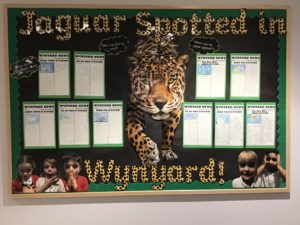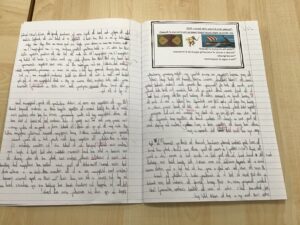English
Like the rest of our curriculum at Wynyard, English teaching is creative, highly engaging and challenging in order to develop a lifelong love of learning and ensure all children achieve their full potential. Lessons are planned around class texts or novels or are linked to the exciting topics that take place across all year groups.
Our English Curriculum
Reading is at the heart of our curriculum and we are committed to developing a love of reading among all our pupils, which we believe is essential for supporting their learning across all subjects.
We cultivate an extremely positive attitude towards reading and our school library is often buzzing with children with their noses buried in books or sharing and discussing their reading experiences with one another. Our library offers a nurturing environment for pupils where they are able to share the joy and enthusiasm they have for their favourite stories and encourages them to suggest texts to one another.
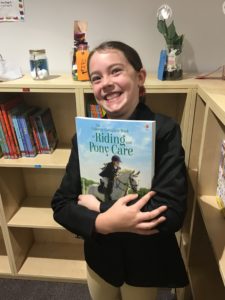
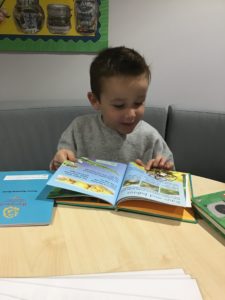
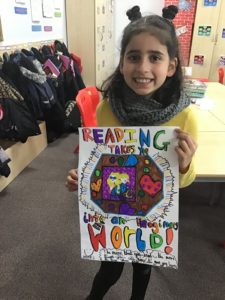
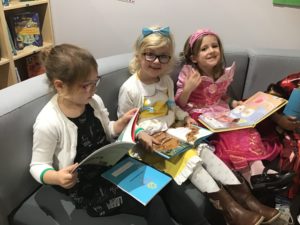
Our dedicated Reading Leads play a vital role in promoting this love for reading throughout the school. They are actively involved in enhancing everyone’s reading journeys through their participation in initiatives, such as ‘Hot Picks’, ‘Pop-Up Poetry’, and our monthly reading newsletter. They also work in conjunction with our English Lead in the preparations for World Book Day.

We are proud to have a staff of enthusiastic readers who utilise high-quality texts linked to various topics and themes, as outlined in our ‘Reading Spine’. This approach ensures that we engage children in a rich literary curriculum, using class texts and novels creatively to explore a diverse range of writing genres. The texts are carefully curated by staff to allow children to use ‘windows’ and ‘mirrors’. They see themselves in some of the texts they read (‘mirrors’) but also have opportunities to use ‘windows’ to see the lives of others. This means children have the opportunity to develop their understanding and application of our Core Christian Values in lesson time as well as outside the classroom.
To foster a passion for reading, every class in the school has a designated reading area where children can immerse themselves in a broad selection of both fiction and non-fiction texts that inspire their imaginations.
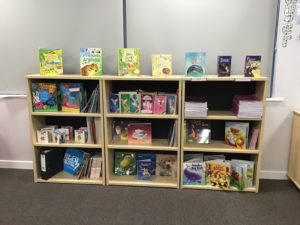
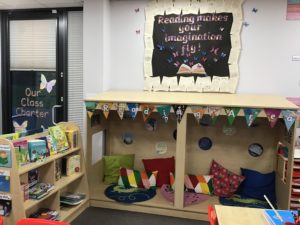
Our reading journey begins right in Nursery, where our youngest pupils engage with text structures through story listening and develop their oral storytelling skills. Phonics sessions are also integral to our programme. Children learn essential skills that will serve them as they progress.
For children on their early reading journey, we continue our commitment to high-quality phonics through the Read, Write, Inc programme, which is designed to ensure that children rapidly develop their reading and writing skills. As pupils advance, we maintain a strong focus on comprehension skills to enhance their ability to understand, discuss, and analyse texts. Reading symbols are used to help children identify the skills they need to employ when reading.
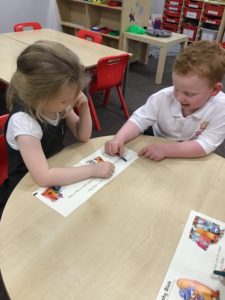
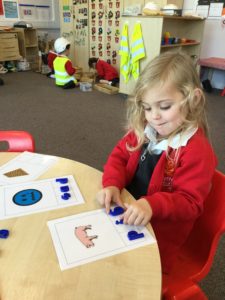
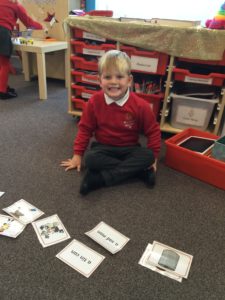
Upon completion of the Read, Write, Inc programme, reading development is supported by a book-banded reading scheme. Each band comprises a variety of texts, including fiction, non-fiction, and poetry, sourced from renowned publications such as Oxford Reading Tree and Pearson. Children regularly read to school staff and bring home a book from their corresponding book band, as well as a library book to share with parents. Additionally, we provide access to an e-library matched to each child’s reading level through the platforms Oxford Owl and Bug Club. These resources are accompanied by your child’s reading record, and we kindly ask parents to complete this record to provide valuable feedback to our staff.
Our reading activities play an integral role in facilitating high-quality writing opportunities that span a wealth of genres. In the Early Years Foundation Stage (EYFS), children embark on their writing journeys through Drawing Club, where they are motivated to write codes and create illustrations based on the books they have explored. This initiative fosters a sense of ‘togetherness’ and encourages even the most reluctant writers to express their creativity.
As children progress to Key Stage 1, they engage in highly exciting ‘quests’ that promote writing for a variety of purposes. Through these experiences, they enhance their understanding of punctuation, grammar features, and various text types and use these to complete each ‘quest.’
Key Stage 2 pupils follow structured creative teaching sequences that allow them to make meaningful connections and utilise grammar, vocabulary, and punctuation in imaginative ways.
Our commitment to high-quality marking and feedback ensures that every child knows how to advance their writing skills and remains continually challenged on an individual basis.
